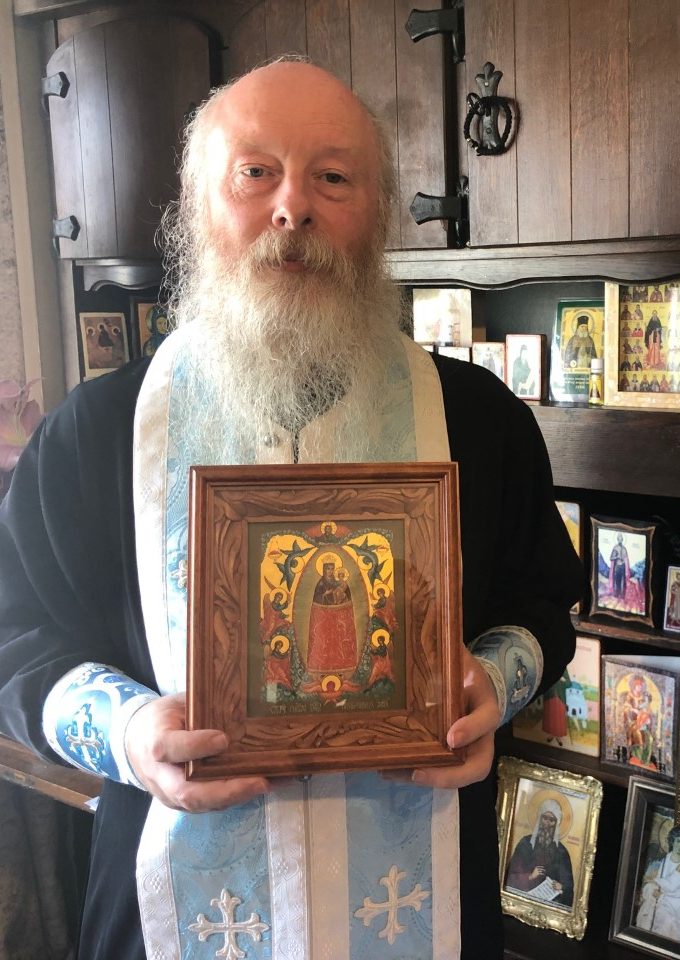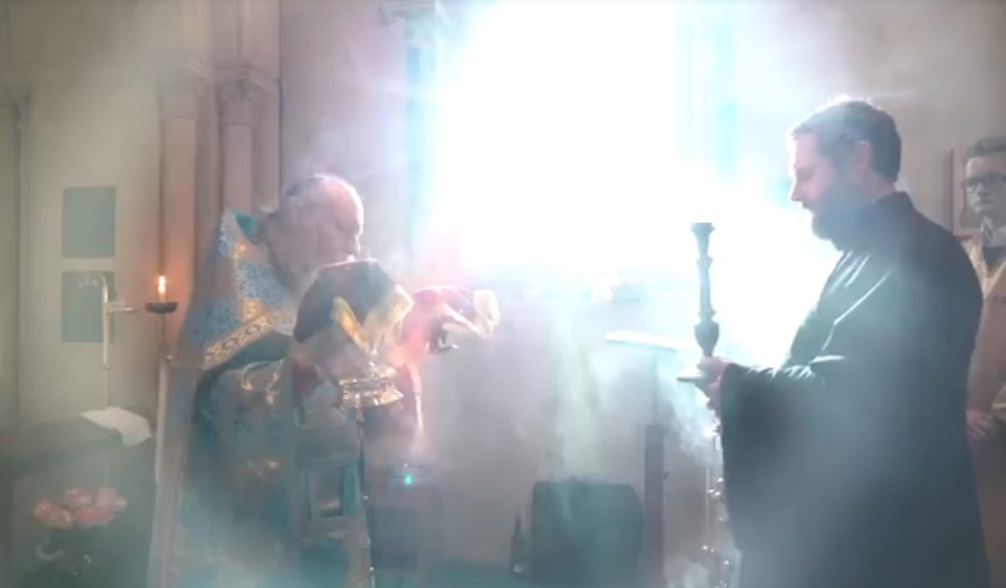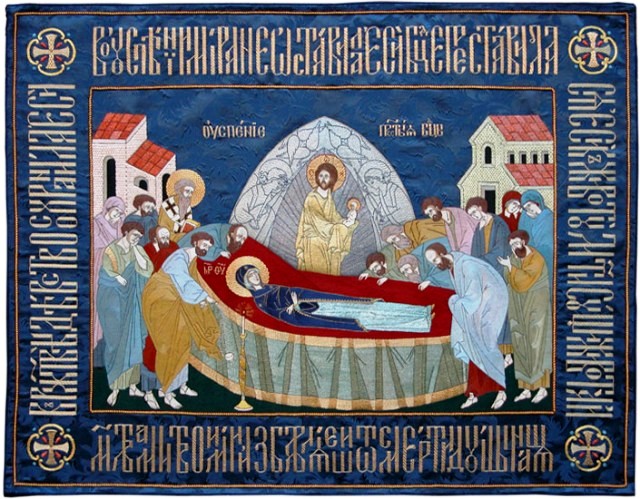Here we are again, with the feast of the Holy Great-Martyr Phanourios marking the transition from summer to Autumn, as we enjoy the fruits of the season and make the most of the garden’s last summer-flowers.
I have been looking back at past Facebook posts, including our celebrations for St Phanourios, with the blessing of Phanouropita in the Little Oratory, replete with photographs of the garden Newman Hall as it passes from one season to another.
I will always be indebted to my Greek pupils and their parents, who introduced me to St Phanurios, who suffered so many tortures before his martyrdom, and then re-revealed himself to the faithful after being forgotten for centuries.
How often the saints introduce themselves to us – through an icon; through a chance encounter with their written life; through a conversation with someone; through the desires of one who wishes to share their love for a saint with us.
The saints continue to become loved by other nations, and other local Churches, becoming truly pan-Orthodox in their relationship with the faithful.
During my years in ‘Londonopoulis’, I had the joy of not only coming to ‘meet’ St Phanourios, but also the Great-Martyr Mamas, St Savas the New, the Greek new-martyrs, and so many holy-ones who have been glorified by the Lord in Greece, Cyprus, and in the other lands that were once the Christian Empire.
However, in St Phanourios we see something truly wondrous, with the finding of his icon in the ruins of a church on the island of Rhodes becoming the beginning of an intense spiritual relationship between the whole Hellenic people and the Great-Martyr: a glorious wonder!
We look forward to blessing Phanouropita at the end of our Liturgy on Sunday, when we will beseech the intercessions of St Phanourios, for our communities and the faithful.
Άγιε του Θεού Φανούριε πρέσβευε υπέρ υμών!
Saint of God, Phanourios, pray for us!

The following account of the life of Saint Phanourios was written by St. Nikephoros of Chios and included in the Kollyvades text known as the New Leimonarion.
Synaxarion
On the 27th of August, commemoration is made of the Holy, Glorious, and Great-Martyr Phanourios the Newly-Revealed
Verses: Phanourios bestows light upon all the faithful,Even though he long lay in the darkness of the earth.
From whence Phanourios, the splendid athlete of the Lord and invincible martyr, came, and of what parentage he was, and even in what age he lived and under the reign of which emperors he waged his struggle and fought his fight, we have been unable to ascertain, for the account of his life has been lost owing to the vicissitudes of time, as many other things also have been lost or become obscure or unclear. This only do we know, that when the Hagarenes ruled the renowned island of Rhodes, having conquered it because of our sins, he that became ruler of the island wished to rebuild the ramparts of the city that past sieges had ravaged. On the outskirts of the fortress were several ruined dwellings that had been abandoned by reason of their association with the old fortress, which was located a furlong to the south. From these ruins the Hagarenes were wont to gather stones for their construction.
It so happened that, while excavating and reinforcing that place, they discovered a most beautiful church, which was partly buried in ruins. Excavating as far as the floor of the temple, they found many holy icons, all decayed and crumbling, yet the icon of the holy Phanourios was whole and entire; indeed, it seemed as though it had been painted but that very day. And when this all-venerable temple was uncovered, together with its sacred icons, the hierarch of that place, Nilus by name, a man of great sanctity and learning, came and read the inscription of the icon, which said, “The Holy Phanourios.”
The Saint was depicted upon the icon as follows: He was shown as a young man, arrayed as a soldier, holding a cross in his right hand, and at the upper part of the cross there was a lighted taper. Round about the perimeter of the icon were twelve scenes from the holy one’s martyrdom, which showed the Saint being examined before the magistrate; then in the midst of soldiers, who were beating him about the mouth and head with stones; then stretched out upon the ground while the soldiers flogged him; then, stripped naked while they rent his flesh with iron hooks; then incarcerated in a dungeon; and again standing before the tyrant’s tribunal; then being burned with candles; then bound to a rack; then cast amidst wild beasts; then crushed with a great rock; then standing before idols holding burning coals in his hands, whilst a demon nearby wept and lamented; and finally he is shown standing erect in the midst of a fiery furnace, his hands, as it were, uplifted towards Heaven.
From these twelve scenes depicted upon the icon, the holy hierarch perceived that the Saint was a martyr. Then straightway that good and pious man sent deputations to the rulers of that place, asking that they consign to him that temple for restoration, but this they declined to do. Therefore, the hierarch traveled to Constantinople alone and there obtained a decree empowering him to rebuild the church; thus it was restored to that state in which it can be seen even to this day, outside the city. And it has become the source of many miracles, of which I shall relate one for the profit of many, that all who love and venerate the Saint may rejoice.
At that time the isle of Crete had no Orthodox hierarch, but a Latin bishop, for it was ruled then by the Venetians, who had shrewdly refused to permit an Orthodox hierarch to be consecrated whenever one died. This they did with evil intent, thinking that with time they could thus convert the Orthodox to the papal doctrines. If Orthodox men wished to obtain ordination, they had to go to Kythera. It came to pass that there went forth from Crete three deacons, traveling to Kythera to be ordained priests by the hierarch there; and when this had been accomplished, and they were returning to their own country, the Hagarenes captured them at sea and brought them to Rhodes, where they were sold as slaves to other Hagarenes. The newly consecrated priests lamented their misfortune day and night.
But in Rhodes, they heard tell of the great wonders wrought by the Great Martyr Phanourios, and straightway they made fervent supplication to the Saint, beseeching him with tears to deliver them from their bitter bondage. And this they did each separately, without knowing ought of what the others were doing, for they had each been sold to a different master. Now, in accordance with the providence of God, however, they were all three permitted by their masters to go and worship at the temple of the Saint; and, guided by God, they came all together and fell down before the sacred icon of the Saint, watering the ground with the streams of tears, entreating him to deliver them out of the hands of the Hagarenes. Then they departed, somewhat consoled, each to his own master, hoping that they would obtain mercy, which in fact did come to pass; for the holy one had compassion upon their tears and hearkened unto their supplication. That night he appeared to the Hagarenes who were the masters of the captive priests, and commanded them to permit the servants of God to go and worship in his temple lest he bring dreadful destruction upon them. But the Hagarenes, thinking the matter sorcery, loaded them with chains and made their torments more onerous.
Then the Great Martyr Phanourios went to them that night and brought them forth from their bonds, and encouraged them, saying that the following day he would, by all means, free them. He then appeared to the Hagarenes and, reproaching them with severity, said: ‘If by tomorrow you have not set your servants at liberty, you shall behold the power of God!’ Thus saying, the holy one vanished. And, O, the wonder! As many as inhabited those houses all arose blind and paralyzed, tormented with the most dreadful pangs, the least with the greatest. But, though bedridden, with the help of their kinfolk they considered what to do, and finally decided to send for the captives. And when the three priests were come, they inquired of them if they were able to heal them; and they answered: ‘We shall beseech God. Let His will be done.’
But the Saint appeared again to the Hagarenes on the third night and said to them: ‘If ye do not send to my house letters of manumission for the priests, you shall have neither the health, nor the light [of sight] which you desire.’ And when they had again conferred with their kinfolk and friends, each one composed a letter of emancipation for his own slave, which were left before the icon of the Saint. And O, the wonder! Even before the messengers sent to the temple returned, those, who before were blind and paralyzed, were healed; and marveling they set the priests free and dispatched them to their homeland amicably. The priests, though, had a copy of the icon of St. Phanourios painted and took it with them to their own country, and each year the memory of the holy one is piously celebrated amongst them. By the prayers of the Martyr may Christ God have mercy upon us. Amen!








